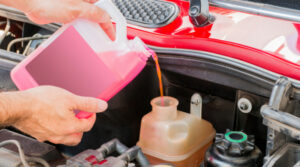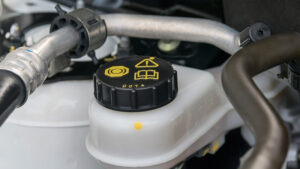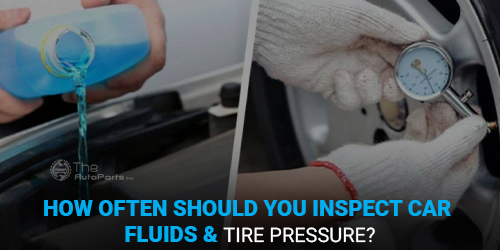Car enthusiasts pay the least attention to fluids and check them when there is physical damage or tear in their thread. These fluids play a significant role in the smooth working of the car components. Tire pressure is another thing that helps you drive safely and smoothly on the road. Both of these things must be checked on a routine basis & must be filled to a certain level to help the car work effortlessly. Below is the list of car fluids to be checked consistently to yield optimum performance from the car.
Which Are the 7 Fluids in the Car?
We often emphasize motor oil that helps the vehicle run smoothly. However, other fluids help in the proper working of the vehicle. The details of the primary seven fluids in the car have been listed as follows:
Transmission Fluid

Every time you visit the mechanic for an oil change, don’t forget to get the transmission fluid checked. The transmission oil can be inspected manually with the help of a dipstick. Get the transmission fluid inspected once you have covered 300,000 miles in the car. The transmission fluid replacement must be carried out after 5 to 6 months.
Windshield Wiper Fluid
Take the windshield wiper fluid for service checks once every two months. This fluid keeps the windshield clear so that the driver can see things smoothly. The fluids must be replaced as the season changes, i.e., after every 5 to 6 months.
Power Steering Fluid
The power steering fluid levels of the car must be checked once every month. You can inspect the fluid mechanically by getting inside the vehicle’s hood & having a look at the reservoir. It is the responsibility of the power steering fluid to keep the steering steady and smooth. Refer to the user manual that reveals the right time to change the fluid.
Coolant
The car coolant must be checked after every 5 to 6 months. It is the responsibility of the coolant to keep the engine’s temperature under control. The coolant levels mustn’t drop below-recommended levels and must be replaced after every 2 to 3 years.
Brake Fluid

Brake fluids must be changed the moment you visit for an oil change which is once a year. You would notice the color changing from golden to brown after every two years. This is a part of the closed system and shouldn’t run low at any point while driving.
How Much Does Fluid Check Cost?
Getting the fluid checked by a dealer or a qualified mechanic would cost you between $80 to $250. Also, $100 will be charged in case you’ve taken the car to the mechanic to get the manual, or automatic transmission changed. Save a lot of money by performing the fluid and tire replacement by yourself. Watch the DIY videos and follow the instructions. Also, be confident about your technical abilities.
Why There’s a Need to Check the Tire Pressure?
Proper tire pressure not only keeps you safe on the road but also increases the longevity of the tires. A deflated tire puts the driver into dangerous situations. It’s better to monitor the tire pressure regularly and get the tire replaced if the condition of the tires has deteriorated severely.
What Are Some of the Ways to Check the Tire Pressure?
A visual inspection won’t help you monitor tire pressure properly. An overinflated tire loses tread touch on the ground, resulting in reduced traction and stability. An underinflated tire makes the tire wear out due to excessive stress, which ultimately leads to vehicle overheating. The PSI levels of the tires must be checked consistently. You can invest in a tire gauge from the customer trusted ‘The Auto Parts Shop‘ to check the tire pressure so that you stay safe on the road.
When is the Right Time to Check the Tire Pressure?
Ensure that the temperature of all four tires is thoroughly checked along with the ones kept spare. Sometimes they need to be checked monthly, and during other seasonal checks must be performed. It’s basically hot summers and cold winters that impact the performance of the tires. The tires do expand with heat and get affected as the temperature drops.
The Bottom Line
Things such as checking tire pressure & fluid mustn’t be taken lightly. Delays would lead to costly repairs in the years to come. A qualified mechanic must be consulted to resolve the issues and prevent them from appearing again.
